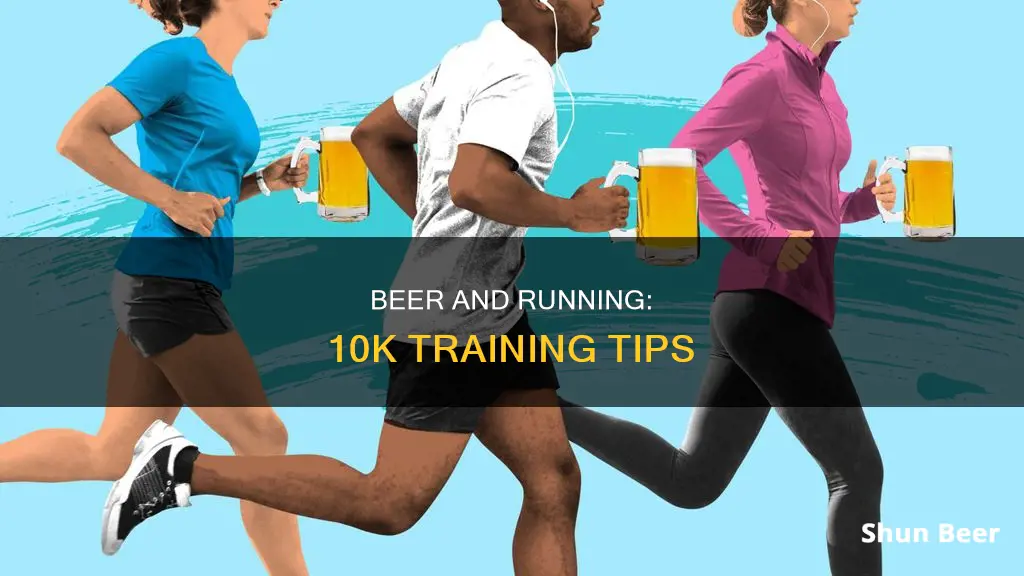
Training for a 10k requires dedication and a lot of preparation, and runners often wonder whether they need to make changes to their lifestyle and habits to perform at their best. One common question is whether it's okay to drink beer while training for a 10k race. While some people enjoy a refreshing beer after a workout, it's important to understand how alcohol affects the body to make an informed decision. Alcohol is a diuretic, which means it increases urine production and can lead to dehydration if not properly hydrated. It also impairs sleep quality, affects heart rate, and reduces the body's ability to repair muscles efficiently. These factors can impact performance and recovery. However, the effects of alcohol are dependent on the amount consumed and individual factors, and a light workout after a couple of beers the night before may be fine for some. Ultimately, it's essential to consider the potential impact on hydration, recovery, and performance and make a decision based on personal goals and tolerance.
| Characteristics | Values |
|---|---|
| Alcohol's effect on the body | Alcohol is a diuretic, impairing sleep quality, impairing judgement and coordination, reducing glycogen replenishment, impairing body temperature regulation, and causing weight gain. |
| Alcohol's effect on athletic performance | Alcohol affects athletic performance, including strength, power, muscular endurance, speed, and cardiovascular endurance. |
| Risks to drinking alcohol before a race | Increased risk of injury, dehydration, reduced glycogen storage, lower sleep quality, and muscle protein breakdown. |
| Recommended amount of time to stop drinking alcohol before a race | 48 hours before, and at a minimum 24 hours before. |
| Alcohol's effect on workout recovery | Alcohol inhibits muscle recovery and performance, interferes with muscle protein synthesis, and diminishes the benefits of exercise on sleep. |
What You'll Learn

Dehydration
There are various factors that influence hydration, including body weight, sweat rate, temperature and humidity, and training history. It is important to consider these factors when developing a hydration strategy for a 10k race. One way to estimate water loss due to sweating and urination is to measure initial weight, food and water intake, time spent training, and final weight. This information can be used to calculate water loss per hour and determine how much water needs to be consumed during the race.
It is also important to remember that simply drinking water may not be enough to stay hydrated. Electrolytes, especially sodium, are crucial for maintaining the body's fluid balance and supporting essential functions such as the movement of fluids and nutrients across cell membranes. Sports drinks can be a good option, as they provide hydration and carbohydrates in a readily usable form. However, they often contain high amounts of simple sugars, which are not ideal for replenishing electrolytes throughout the day. Specialized products designed for endurance athletes may be a better option, as they contain higher amounts of sodium and other minerals such as potassium, calcium, and magnesium, which are important for muscle and nerve cell functioning.
Overall, staying hydrated is crucial for optimal performance in a 10k race. By understanding the factors that influence hydration and developing a hydration strategy, runners can ensure they are properly fueled and hydrated to cross the finish line feeling strong.
Plasma Donation and Beer: A Day's Difference
You may want to see also

Sleep quality
Alcohol acts as a sedative, reducing the time it takes to fall asleep. However, it also impairs sleep quality, resulting in shorter sleep duration and a lack of deep sleep. This can leave you feeling tired the next day, making training and racing more challenging. Poor sleep can also negatively impact your athletic performance and increase your risk of injury.
Drinking alcohol can also affect your body's ability to regulate its temperature, which may further disrupt your sleep. Additionally, alcohol consumption can lead to weight gain, which can impact your running performance.
To maintain optimal sleep quality while training for a 10k, it is advisable to reduce or avoid alcohol consumption. This will help ensure you get the restorative sleep needed to support your training regimen and improve athletic performance.
The History of German Beer Steins and Drinking Culture
You may want to see also

Risk of injury
Drinking alcohol can increase your risk of sustaining an injury. This is due to a number of factors, including impaired coordination, balance, and spatial awareness. As a result, you are more likely to trip over, drop a weight, or injure yourself in other ways. This is especially true if you are still under the influence of alcohol during your workout. Therefore, it is recommended that you wait until you are fully sober before exercising.
Alcohol also affects your heart rate and can lead to arrhythmias (abnormal heart rhythms) after very heavy drinking. This is particularly dangerous if you are engaging in strenuous physical activity, such as training for a 10k.
In addition, alcohol is a diuretic, which means it increases urine production and can lead to dehydration if you don't drink enough water. Dehydration can further increase your risk of injury during exercise.
Furthermore, drinking alcohol can reduce your body's ability to synthesise proteins, which are necessary for muscle repair and recovery. This means that it will take longer for your body to recover from workouts, and you may be more susceptible to injuries.
One study found that the rate of injury incidence for athletes who drink alcohol was 54.8%, compared to 23.5% for those who did not drink alcohol. This suggests that drinking alcohol can significantly increase the risk of sustaining an injury, which may derail your training for a 10k.
To minimise the risk of injury, it is recommended to avoid drinking alcohol 48 hours before a race or intense workout. This will help ensure that your body is properly hydrated and has adequate glycogen stores, reducing your risk of injury.
Botox and Beer: What's Safe to Drink Post-Treatment?
You may want to see also

Muscle recovery
When it comes to muscle recovery, there are several factors to consider. Here are some key points to keep in mind:
- Alcohol's Impact on Hydration: Alcohol is a diuretic, which means it increases urination and can lead to dehydration. Proper hydration is crucial for muscle recovery, and dehydration can hinder the process. It is important to prioritize hydration before and after a 10K run, and alcohol can interfere with this process.
- Impaired Glycogen Replenishment: Alcohol consumption can negatively affect glycogen replenishment and storage. Glycogen is essential for muscle fuel during endurance exercises like a 10K. Lower glycogen levels can lead to heavy legs, fatigue, and reduced power.
- Sleep Quality: Alcohol can disrupt sleep quality, leading to tiredness during training. Adequate sleep is vital for muscle recovery, as it is during sleep that the body repairs and regenerates tissues, including muscles.
- Muscle Protein Breakdown: Alcohol consumption can lead to muscle protein breakdown, hindering the muscle recovery process. It interferes with muscle protein synthesis, which is necessary for rebuilding and recovery.
- Increased Risk of Injury: Alcohol consumption increases the risk of injuries, which can set back training progress. It impairs judgment and coordination, making accidental injuries more likely.
- Inflammation and Immune Function: While certain compounds in beer, such as polyphenols, can have anti-inflammatory and antioxidant effects, excessive alcohol consumption can contribute to inflammation and compromise immune function.
To support muscle recovery while training for a 10K, it is generally recommended to limit alcohol consumption. Non-alcoholic beer or low-alcohol beer (<4% ABV) may be a better option for rehydration and can provide some anti-inflammatory benefits. However, excessive consumption or higher alcohol content can lead to negative effects, including dehydration, reduced muscle gains, and impaired recovery. It is crucial to prioritize overall hydration, adequate sleep, proper nutrition, and injury prevention for optimal muscle recovery.
Mixing Beer and Wine: What's the Harm?
You may want to see also

Weight gain
Additionally, studies have shown that alcohol consumption leads to poorer food choices. This means that you are more likely to opt for unhealthy foods when drinking beer, which can contribute to weight gain.
If you are drinking beer after a workout, it is important to be mindful of how it may impact your body's ability to rehydrate and recover. Alcohol affects your body's ability to rehydrate, and as you typically lose water through sweating during exercise, drinking beer after a workout will make it take longer for your body to rehydrate and recover. This can leave you feeling sore for longer.
If you are training for a 10k, it is worth considering the potential impact of beer or alcohol consumption on your weight and overall performance. Regular alcohol consumption can lead to weight gain, which is usually not preferred by runners, as a lean physique can improve pace and performance.
Horses and Beer: Is It Safe for Them to Drink?
You may want to see also
Frequently asked questions
It is not recommended to drink beer when training for a 10k. Alcohol has several negative effects on the body, including dehydration, impaired glycogen replenishment, lower sleep quality, and muscle protein breakdown. These factors can affect your performance and recovery.
Alcohol is a diuretic, which means it increases urine production and can lead to dehydration if not properly hydrated. It also affects the liver's ability to produce glucose and clear lactic acid. Alcohol is a depressant, which can relax you but also impair your balance, coordination, and mood. Heavy drinking can cause arrhythmias or abnormal heart rhythms.
Drinking alcohol can compromise your sleep and reduce your body's ability to store glycogen, which is essential for endurance. It can also increase the risk of injury by elevating cortisol levels, which slows down the repair process. Alcohol can also affect your decision-making, leading to impaired judgment and increased risk of accidental injury.







